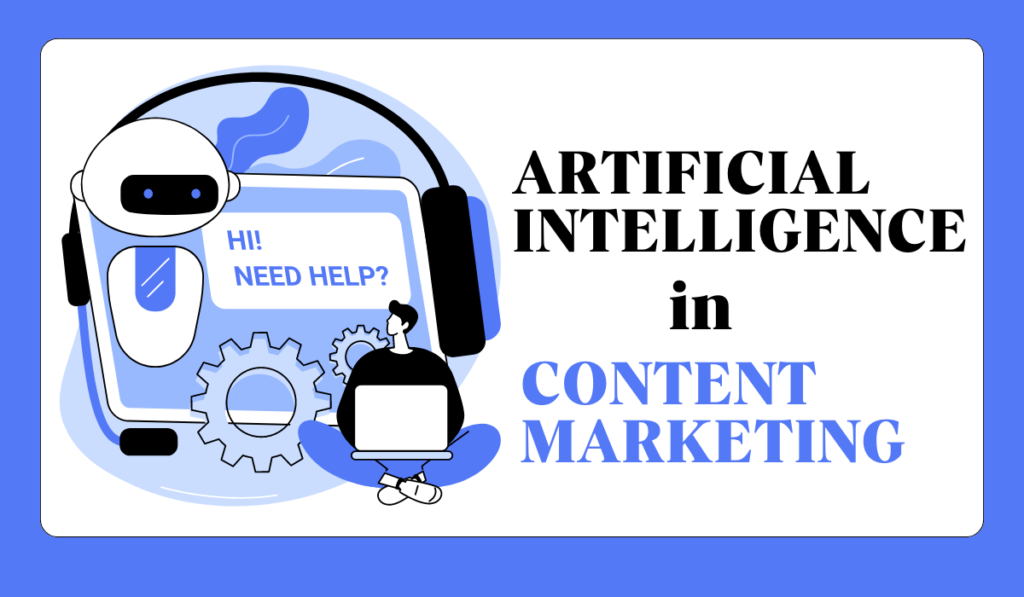However content remains king in a constantly evolving world of digital marketing. However, content marketing guidelines have evolved dramatically, particularly as artificial intelligence (AI) has developed. AI technologies are currently changing ways as companies create, distribute, and manage information in order to accomplish more efficient, timely, and personalized ways. We will thus examine how AI is influencing content marketing in this article.
Content Marketing and its relation with artificial intelligence
Artificial Intelligence in content marketing involves using machine learning, NLP, and advanced technologies for creating, promoting, and delivering content. This ranges from automating tasks like scheduling to using predictive analysis for strategic decisions and enhancing consumer engagement.
Key Applications of AI in Content Marketing
Content Creation and Ideation
- Generating Ideas: AI identifies trending topics, audience interests, and competitor content to recommend niche-specific ideas.
- Automated Writing: AI models create error-free articles, reports, and other content forms.
- Enhanced Visual Content: Tools like Canva’s Magic Write and Lumen5 generate visuals, infographics, and videos.
Personalization of Content
AI excels at personalizing content based on user behavior and history, leading to:
- Dynamic Content: AI displays relevant posts, products, and ads based on user activity.
- Targeted Email Campaigns: AI segments audiences and delivers personalized emails, boosting open rates and conversions.
- Personalized Website Experiences: AI adjusts website content and design to user preferences.
Content Optimization and SEO
AI is crucial for SEO, optimizing content by analyzing keywords and user intent for better rankings.
- SEO Optimization: Tools like Clearscope and Surfer SEO guide keyword alignment and content structure.
- Content Scoring: AI evaluates content quality and readability, providing improvement suggestions.
- Voice Search Optimization: AI adapts content for voice search with conversational keywords.
Content Distribution and Scheduling
AI enhances content distribution by automating scheduling, choosing optimal posting times, and selecting platforms.
- Social Media Scheduling: AI tools like Buffer and Hootsuite suggest the best times to post based on audience behavior.
- Smart Content Distribution: AI automates content sharing across blogs, social media, email, and ads.
Audience Analysis and Insights
AI tools offer insights into audience behavior and engagement, aiding strategy adjustments.
- Sentiment Analysis: AI detects audience sentiments, refining brand approaches.
- Performance Tracking: AI monitors metrics like page views and conversions, offering feedback on audience preferences.
- Predictive Analytics: AI forecasts content trends and audience behavior, helping marketers stay ahead.
Content Curation
AI streamlines content curation by finding and sharing relevant external content.
- Automated Curation: Tools like Feedly and Curata help find and share relevant content, maintaining brand consistency.
- Enhanced Relevance: AI curates and shares content to improve engagement and authority.
Advantages Of AI In Content Marketing
Increased Efficiency and Productivity
It saves time in researching keywords, organizing the content calendar, and analyzing the performance to allow the marketers to spend time on the creative and planning aspects. This results in enhanced efficiency meaning that the turnover is faster and the content being produced is more uniform.
Data-Driven Decisions
AI gives marketers data-driven recommendations on what content to develop, when to release it, and how to enhance it for higher effectiveness. We are then able to reduce guesswork and increase returns on the investment.
Improved Content Quality
AI tools improve the quality of the content by allowing the writer to see, for instance, Readability scores, grammar mistakes, SEO, and engagement scores in real-time. This continuous optimization helps in sustaining high content standards that are likely to appeal to the audience.
Enhanced Audience Engagement
Branded content is an engaging custom content experience that helps consumers build a better relationship with the brands. AI has the ability to present content that is in line with users specific preferences thus making the interactions more personal.
Scalability
By using AI, content marketers can achieve more in their work by not having to spend more money, time or manpower. Thanks to AI, content is automatically generated and distributed, which can potentially reach more people with little to no extra work on the brands’ part.
AI in Content Marketing Management: Problems
Quality Control and Authenticity
Though using AI to generate content may be much more efficient, it suffers from the drawbacks of being less creative, less empathetic and less authentic as that of the content generated by humans. To ensure that AI-generated content does not deviate from the whole purpose of the brand’s values, there has to be supervision and adjustment.
Dependence on Data Quality
This paper will establish that AI solutions’ outcomes significantly depend on the data used in developing the algorithms. This paper also explains that wrong, or even biased data results in wrong recommendations and poor performance.
Ethical Concerns
AI in the process of content creation brings concerns and debates on the issues of the author’s identity and truthfulness. As is evident, marketers must be careful of these issues and apply AI in appropriate and sensible ways.
Integration and Technical Expertise
AI solutions use to marketing face various technical challenges and demand integration into current marketing platforms. Small and medium enterprises may have problems when implementing AI since it can be costly and requires expertise.
Future of AI in content marketing
Content marketing with AI has a promising future as AI evolves, making advanced tools accessible to all. Key trends include deeper personalization, advanced analytics, and AI chatbots for live updates. AI will increasingly shape content strategies, enhancing how brands connect with audiences.
Conclusion
AI continues to adapt content marketing in the era through fostering innovation, means, and one’s personality. Using AI in content creation, optimization, distribution and evaluation, marketers are enabled to deliver better and more compelling content. While AI is valuable, it must be used judiciously to ensure human oversight for originality, integrity, and ethical standards. AI is poised to become a crucial tool in content marketing, driving the future of digital experience.

